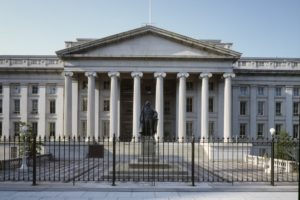
Treasury targeted six Iran-based petrochemical manufacturers and their subsidiaries, and three firms in Malaysia and Singapore involved in facilitating the sale and shipment of petroleum and petrochemicals on behalf of Triliance Petrochemical, which OFAC designated in January 2020 for facilitating the sale of Iranian petroleum products from the National Iranian Oil Company.
Iranian Petrochemical Producers
OFAC designated Iranian petrochemical producer Amir Kabir Petrochemical Company (AKPC), a major polyethylene producer. Triliance has purchased millions of dollars’ worth of low-density polyethylene produced by AKPC for shipment to buyers in the People’s Republic of China.
OFAC also added Simorgh Petrochemical Company, a fully owned subsidiary of AKPC, to the List of Specially Designated Nationals and Blocked Persons (SDN List).
OFAC also took action against four subsidiaries of Iran’s Marun Petrochemical Company, which OFAC designated in June 2022 for its role in supplying millions of dollars’ worth of petrochemicals to Triliance. The subsidiaries OFAC added to the SDN List for being owned in the aggregate, directly or indirectly, 50 percent or more by Marun Petrochemical Company are Laleh Petrochemical Company, Marun Tadbir Tina Company, Marun Sepehr Ofogh Company, and Marun Supplemental Industries Company.
Triliance Enablers
OFAC also has designated the following three entities:
- Singapore-based Asia Fuel, which since 2021 “has facilitated the shipment of petroleum products worth millions of dollars to customers in East Asia” and further “arranged to pay storage fees on behalf of Triliance to house petroleum products in a Malaysia-based floating storage vessel,” OFAC said.
- Malaysia-based Sense Shipping and Trading (previously, Eastchem Shipping), a front company for Triliance that, according to OFAC, “facilitated Triliance’s shipment of tens of thousands of metric tons of petrochemicals to foreign customers.”
- Singapore-based Unicious Energy, which “serves an important role in Triliance’s network, coordinating millions of dollars in petroleum-related payments for other companies within the network and aiding Triliance in its sale of hundreds of millions of dollars of petroleum products.”
Sanctions Implications
As a result of these actions, OFAC said, “all property and interests in property of these targets that are in the United States or in the possession or control of U.S. persons must be blocked and reported to OFAC. In addition, any entities that are owned, directly or indirectly, 50 percent or more by one or more blocked persons are also blocked. OFAC’s regulations generally prohibit all dealings by U.S. persons or within the United States (including transactions transiting the United States) that involve any property or interests in property of blocked or designated persons.”
“In addition, persons that engage in certain transactions with the individuals and entities designated today may themselves be exposed to sanctions or subject to an enforcement action,” OFAC added. Furthermore, OFAC warned, “unless an exception applies, any foreign financial institution that knowingly facilitates a significant transaction for any of the individuals or entities designated could be subject to U.S. sanctions.” ![]()
Jaclyn Jaeger is a contributing editor at Compliance Chief 360° and a freelance business writer based in Manchester, New Hampshire.

